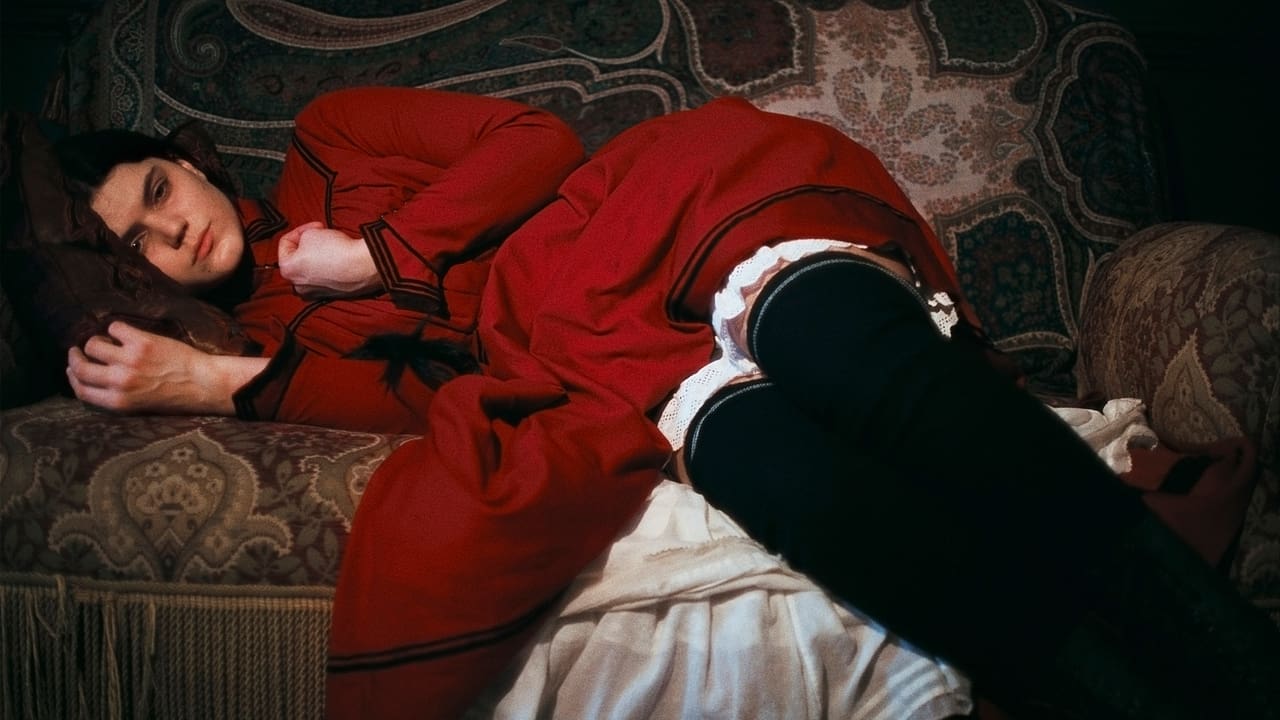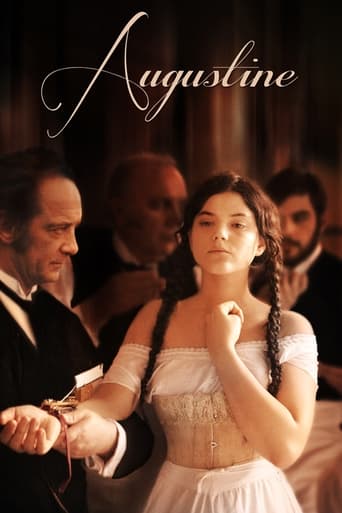

This is rather a sensationalised and eroticized rendition of filmmaking loosely based on facts.Although well acted, well filmed and very intriguing throughout, it nonetheless did not treat the subject material in a way that fully depicted what countless many young women of the day endured: early sexual abuse and it's life-harming effects.One of the factual details that is notably absent from Winocour's film is the sexual assaults the young Augustine suffered at the hands of an employer with whom she was placed by her mother at age thirteen. The details of her rape do not get mentioned and neither does her trauma,or the information that the attacks began soon after.From the symptoms of her 'illness,' in this film, the causes or triggers for Augustine's episodes often feature in scenes of animal cruelty. The film does not treat her history of sexual abuse and it has Augustine enter the Salpêtrière at age nineteen, while, in fact, she was fourteen when she began her stay. Very much younger. Still a child.If the filmmaker had stuck to a factual rendition of how so many girls were sold or traded or sent off to work in situations where they were never protected, never able to protect themselves and where the theme of the day in most of Europe was early sexual abuse of horrific proportions, there may have been a film that explained how generationally women have been exploited, manhandled, marginalised and mistreated almost as point of course.A hugely wasted opportunity to make an important film.
... View MoreThis slow and subtitled French film that is based on actual events won't be one many are going to out-right enjoy although I found it to be rather interesting as I find its subject matter -- 19th century female hysteria -- to be most fascinating.The film is about Augustine, an illiterate young French housemaid (played by French singer/actress Soko), who suffers a debilitating seizure one evening while serving dinner that leaves her partially paralyzed. She is thus admitted to the Parisian psychiatric hospital, Pitié-Salpêtriere, where she is diagnosed as a hysteric (!) and treated by renown physician Jean-Martin Charcot (Vincent Lindon - Mademoiselle Chambon).The medical world of the 19th century was dominated by uber-intelligent men (that "intelligent" part could be debated) and it was common for a woman who experienced something that a man couldn't easily explain and/or understand to be diagnosed with "hysteria" (a "nice way" of saying a female sexual perversion). If a woman acted in any manner society found confusing or even slightly objectionable, she was a "hysteric" who could find herself institutionalized and subjected to some horrifyingly abhorrent and offensive "treatment(s)" at the hands of men who claimed a medical interest in her well-being.The time period and "understanding" of this predominately female ailment IS genuinely fascinating and if this topic sounds even remotely intriguing, I implore people to seek out the topic and read up on it as Augustine is merely about A case -- AN instance -- in this outrageously baffling era of medical (mal)practice when many male doctors found it to be en vogue and "fashionable" to make these diagnoses! The level of quasi-ignorance shared by these male "geniuses" in the medical field who simply did not understand women is mind-blowing.I think a better film would have focused more on the doctor and his evolving understanding of hysteria over the years that followed this brief amount of time spent with this one patient, Augustine. There is a reason the film was not entitled Charcot. Instead, the direction of Alice Winocour (a WOMAN!!!?!) has used a specific example to reveal a sad universal truth of the time and expose just how farcical this "ailment" was while subtly implying perversions may have lain elsewhere. As Winocour's first full-length feature film that is clichéd a time or two, she shows much promise. Diagnose that, Charcot! Again, the movie is hard to simply "enjoy" but it is one that could hopefully shed some more light on this bizarre chapter of modern medicine.
... View MoreThis film kept my attention from start to finish. Beautiful woman, mysterious ailment, reserved doctor, 19th century setting, beautiful costumes, beautiful settings and scenery. Sensuous undertones and a dash of smoldering sexually. I must watch again, this time with my lady.I am a man of letters and my review is more than adequate. Requiring ten lines before a review may be published does a disservice to those who write reviews and those who read (or more accurately, can not) the reviews.This film kept my attention from start to finish. Beautiful woman, mysterious ailment, reserved doctor, 19th century setting, beautiful costumes, beautiful settings and scenery. Sensuous undertones and a dash of smoldering sexually. I must watch again, this time with my lady.I am a man of letters and my review is more than adequate. Requiring ten lines before a review may be published does a disservice to those who write reviews and those who read (or more accurately, can not) the reviews.This film kept my attention from start to finish. Beautiful woman, mysterious ailment, reserved doctor, 19th century setting, beautiful costumes, beautiful settings and scenery. Sensuous undertones and a dash of smoldering sexually. I must watch again, this time with my lady.I am a man of letters and my review is more than adequate. Requiring ten lines before a review may be published does a disservice to those who write reviews and those who read (or more accurately, can not) the reviews.
... View MoreMaybe not worth an Oscar nomination, but the French singer SoKo did a great job with this role (not unlike the young actress, Quvenzhané Wallis, who did a great job in an otherwise a painfully flawed "Beast of the Southern Wild"). "Augustine" does a great job of highlighting the attitudes and practices that existed during the 19th century as psychiatry was trying to become a science. And as backward and ignorant as the beliefs of Charcot will appear to many, who lack a sense or knowledge of history, it is even sadder to think that Charcot was actually a genius compared to most of the people of his era, and that he was a definite improvement over the entire rest of human history that preceded the 19th century. At least Charcot tried to break out of the ignorance that enveloped (and still envelops much of) humanity when it comes to the "mentally ill" and the epileptic. The worse part of the movie is the ending, that final encounter between Charcot and Augustine after Charcot's presentation of Augustine to a group of French scientists; it just didn't make sense. But overall "Augustine" is better than average...and nowadays that's a lot since even better-than-average films are so rare.
... View More